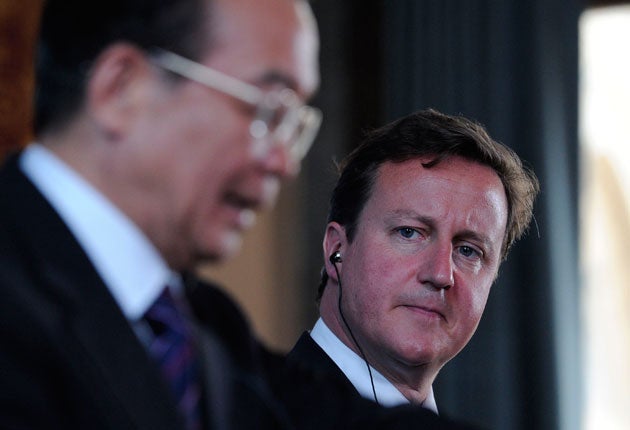Don't lecture China about human rights, premier warns Cameron
Prime Minister raises issue of imprisoned dissidents as Britain signs £1.4bn trade deals at end of visit. Nigel Morris reports

The Chinese Premier warned Britain against "finger-pointing" and "lecturing" the world's most populous nation about human rights abuses yesterday as he signed trade agreements worth £1.4bn with David Cameron.
The carefully-orchestrated three-day visit by Wen Jiabao had included a visit to William Shakespeare's birthplace in Stratford-upon-Avon, a tour of a Birmingham car factory and a show of pomp in London, away from demonstrators.
But the key moment came yesterday when the two leaders witnessed 24 trade agreements and memorandums of understanding between the two countries, covering banking, mining, oil and gas, alcohol and even supply of 800 pigs to China.
The deals came as a welcome boost for Mr Cameron, who is anxious to close the huge trade gap with China and to tap more effectively into a burgeoning consumer market.
But the Prime Minister faces a tricky balancing act in winning new business for British exporters at the same time as highlighting the Beijing government's lamentable human rights record. Mr Cameron insisted yesterday that "nothing is off limits" in the discussions between the governments – and privately raised the imprisonment of prominent dissidents, who include the Nobel Peace Laureate Liu Xiaobo.
In a joint press conference at the Foreign Office, he attempted to reconcile the two issues by arguing that better human rights helped to foster economic growth. Beijing had removed a potential stumbling block to the talks by releasing the artist Ai Wei Wei and the environmentalist Hu Jia on bail days before Mr Wen landed in Britain.
However, the Chinese leader issued two diplomatically phrased, but unmistakable, rebukes to his British hosts – both in government and in the media – for their continuing focus on the issue. He said the countries should "respect each other, respect the facts, treat each other as equals, engage in more co-operation than finger-pointing and resolve our differences through dialogue".
Later he suggested that critical Western nations often knew little about Chinese society and history, adding that the country had learnt over 5,000 years "never to talk to others in a lecturing way, rather to respect others on the basis of equality".
Mr Wen insisted there was "no big strategic conflict between us", and added: "Our common interests outweigh our differences." He said it was a mark of this relationship that China would be sending two giant pandas – Tian Tian and Yangguang – to Edinburgh Zoo by the end of the year. Only seven months ago, Mr Cameron led a delegation of four Cabinet ministers and more than 40 business leaders to Beijing as he seeks to narrow a huge trade gap with China, whose economy is growing at a pace unimaginable in the West.
That visit produced relatively slim pickings in terms of trade deals. But London believes it helped to establish contacts that will lead to firm business deals and Mr Cameron said yesterday that exports to China had leapt by more than a fifth in recent months.
Yesterday's agreements were the fruit of prolonged negotiations between Britain and China with the two leaders on hand to confirm them. But the Prime Minister hopes they will be a stepping-stone towards achieving his target of expanding bilateral trade between the nations to $100bn (£62.5bn) by 2015.
To date, Britain has failed to make substantial inroads into the massive Chinese market which has a fast-growing middle class, keen to splash out on designer items. Imports of Chinese products are worth three times more than British goods going in the opposite direction, with the UK trailing Germany, France and Italy in sales in China.
As Premier Wen left Britain last night for talks in Germany, Mr Cameron was accused of pulling his punches over his guest's human rights record.
"The Prime Minister abandoned the British people's values for the promise of more Chinese investment," said a spokesman for the Free Tibet campaign. "In his eagerness to build trade with China, he failed utterly to take a firm, public position on human rights concerns."
Join our commenting forum
Join thought-provoking conversations, follow other Independent readers and see their replies
Comments
Bookmark popover
Removed from bookmarks